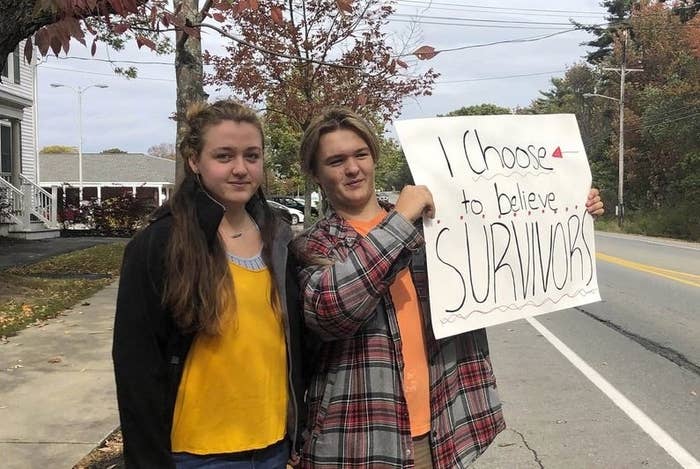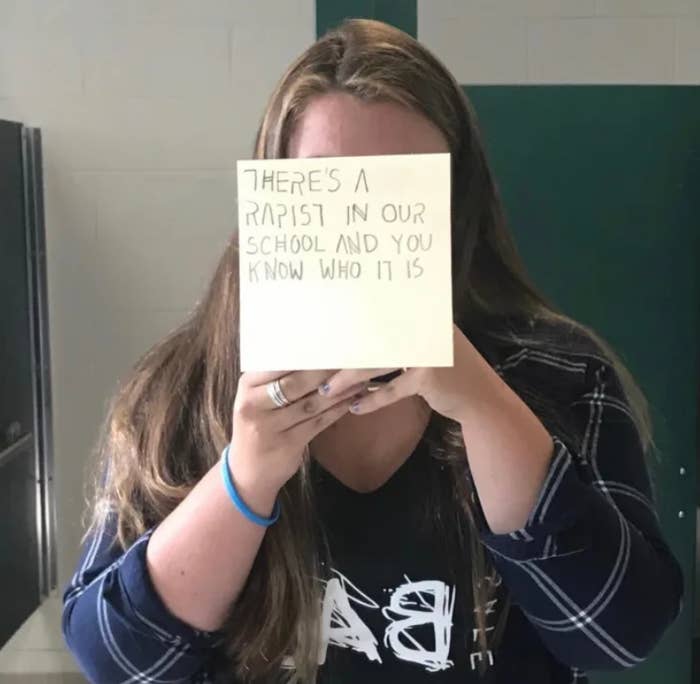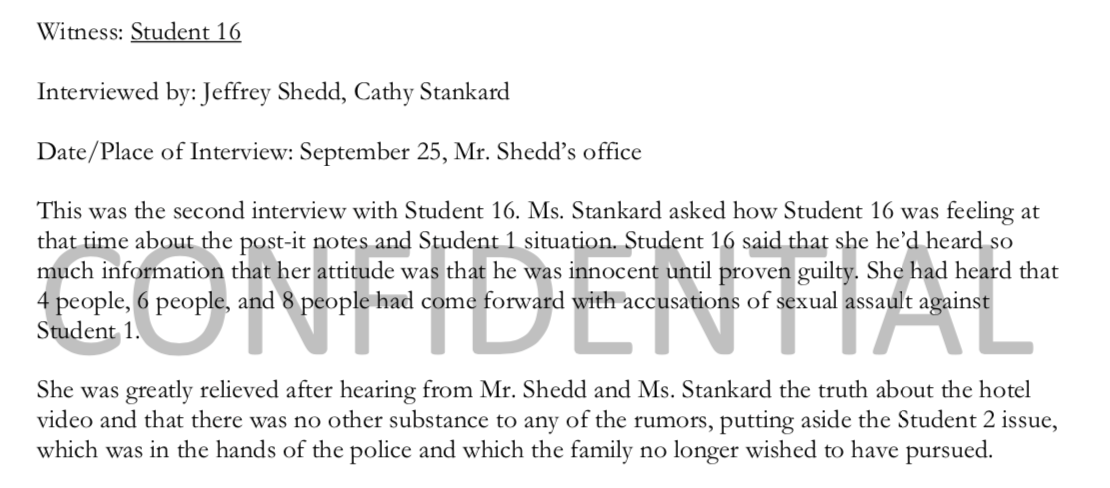
A Maine federal judge blocked the three-day suspension of a student who posted a note in her high school's bathroom about a "rapist," ruling that the teen's comments were constitutionally protected free speech.
Aela Mansmann, 15, was suspended from Cape Elizabeth High School for "bullying" after she wrote "there’s a rapist in our school and you know who it is" on a sticky note and placed it on the mirror in the women's bathroom.
On Oct. 13, two days before the suspension was set to begin, Mansmann's parents and the American Civil Liberties Union (ACLU) filed a lawsuit on her behalf against the school district, arguing that the note was "First Amendment-protected speech meant to call attention to sexual assault at the school and to hold the school administration accountable for keeping students safe."
In the filing, and in a hearing on the matter on Oct. 21, Mansmann's lawyers requested a temporary restraining order that would allow the sophomore to continue attending school until the matter was resolved.
US District Judge Lance Walker on Thursday granted the restraining order, which specifically blocks the school district from enforcing the three-day suspension.
In his ruling, Walker wrote that the evidence in the case suggests Mansmann has a high likelihood of success if the matter is fully litigated.
"The record suggests (but does not conclusively establish) that the expressive activity the Defendants would punish was neither frivolous or fabricated, took place within the limited confines of the girls' bathroom, related to a matter of concern to the young women who might enter the bathroom and receive the message, and was not disruptive of school discipline," Walker wrote.
“The public has an interest in knowing that neither [Mansmann] nor any other student who expresses a comparable view in similar fashion will be denied access to school simply because her viewpoint offends the sensibilities of school administrators," Walker wrote. "Something more is necessary to justify punishment. If school administrators receive carte blanche to tamp down and vet non-frivolous outcries on topics of social justice, expressed in areas generally associated with free student communication, where would that leave us?”
Superintendent Donna Wolfrom told Buzzfeed News in a statement "the safety of our students is our highest priority."
"Every Cape Elizabeth School Department administrator, teacher, and staff member works hard to provide the safest possible learning environment for our students," she said. "We will continue to review and update district policies to align with state law and meet the needs of the district. We will move forward with the education and support of our students, and remain ever thankful to the Cape Elizabeth community for their continued support in this effort."

Mansmann and other female students placed notes in the school's women's bathrooms on Sept. 16, according to court documents. When the notes were brought to the attention of the school's administration, Cape Elizabeth High School principal Jeffrey Shedd and vice principal Nate Carpenter investigated who wrote the noted and whom the notes were referring to. Shedd also sent a letter addressing the incident to the student body on Sept. 20.
Security video camera footage identified Mansmann as the author of the original note, but administrators interviewed more than 40 students over a period of three weeks as part of this "extensive" investigation.
According to court records, the investigation period "stirred up the hornet’s nest
of gossip and rumor" at the high school.
"Eventually, a certain male student (identified by the parties as “Student 1”) experienced what could be described as ostracism by his peers. Upset by his experience, Student 1 remained out of school for several days. Student 1’s family informed the School that they considered the entire incident to be a matter of bullying and the school administrators ultimately decided that they agreed with that characterization," Walker wrote.
On Oct. 4, the school district suspended Mansmann and two other students for posting the notes.
"That kinda confuses me, right? Because this person wasn't identified in the sticky notes," Mansmann said in an interview with BuzzFeed News Oct. 8. "In fact, there's more than one person that was being referred to [in the notes]. Yet this person self-identified feeling targeted, so the school took steps to suspend me versus further investigating that self-identification."
Mansmann appealed the suspension on the grounds of freedom of speech, but superintendent Donna Wolfrom upheld the school's decision. Following Wolfrom's ruling, Mansmann and the ACLU filed suit.
"Speaking up about sexual assault is already difficult for young people," ACLU of Maine's executive director Alison Beyea said in a statement in response to Thursday's ruling. "If this punishment had been allowed to stand, it would have only made it more difficult. Today’s decision reaffirms that students have the right to freedom of speech, and that they do not check their rights at the schoolhouse gate.”
In sworn affidavits and a summary of the school’s investigation submitted Oct. 17 as evidence to the court, multiple school administrators referenced an “incident” between the alleged bullying victim and a female student — identified as “Student 2" — that necessitated police involvement. Though Student 2 and her family did not pursue charges, she obtained a protection order against Student 1 following the incident, according to the school's documents. The protection order is still active, expiring at the end of the current school year.

“That case, which has been known about since last spring, was one basis for the assertion that there was a ‘rapist’ in school,” the school’s administration said in the investigation summary. “However… that case is not a fair basis to that assertion.”
Administrators concluded that there was no evidence supporting the rumors circulating among the student body about Student 1 — among them that he had assaulted his prom date, which she denied in an interview with school officials.
On Sept. 25, Shedd and the school’s Title IX coordinator told a female student that there was “no other substance to any of the rumors [about Student 1], putting aside the Student 2 issue, which was in the hands of the police and which the family no longer wished to have pursued,” the school said in the documents.
